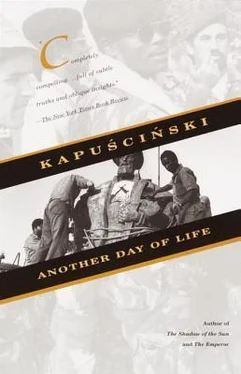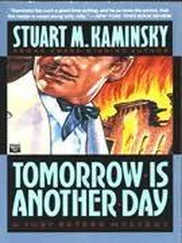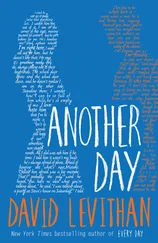It was dark by the time I walked out into the square. Empty houses, no lights, windows broken, smashed shops. Some dogs near the well. Nobody’s cow, with its nose in the grass.
The front.
The dark wall of bush on all sides, and in the bush perhaps those FNLA soldiers who won’t hold out long without water and will give up tomorrow if they don’t die of thirst.
A dead little town, overwhelming emptiness and night. There are voices, conversations, and even laughter in only one place, at the other end of the square. Over there, where there is a small wall surrounded by a concrete balustrade, with a clump of trees in the middle. I walked toward the yard, stumbling over stones, artillery shells, an abandoned bicycle.
The FNLA prisoners, the 120 captured this morning during the battle for Caxito, stood along the inside of the balustrade. Along the outside, in the street and the square, stood MPLA sentries. There were a dozen or so of them.
Prisoners and guards were carrying on a lively conversation, arguing over the result of yesterday’s soccer match. Yesterday, Sunday, Benfica defeated Ferroviário 2–1 at the stadium in Luanda. Ferroviário, which had not lost in two years, left the field to the boos of its own fans. The team lost because its premier striker and league-leading scorer, Chico Gordo, had left his club to play for Sporting de Braga in Portugal.
They could have won.
No way.
Chico Gordo — so what! Norberto’s just as good! But they lost anyway.
Norberto? Norberto isn’t fit to carry Chico’s shoes.
Divided into two camps, ready to leap at each other ’s throats, the boys wrangle and debate. Except that the dividing line doesn’t run along the concrete balustrade. Ferroviário has fans among both prisoners and guards. And in the other camp, the camp of the Benfica fans celebrating their splendid triumph, there are also both prisoners and guards. It is a fervent argument, full of youthful passion, like the ones you can see anywhere in the world among boys leaving the stadium after a big game. In this kind of discussion you forget about everything.
And it’s good that you can forget about everything. That you can forget about that battle, after which there were fewer of us on both sides of the balustrade. About the roundups that Mobutu’s soldiers carry out. And about how we have to grow up to war, so that there will be less and less blind shooting and more and more death.
For a long time now, I’ve been making expeditions to the general staff to secure a pass for the southern front. Moving around the country without a pass is impossible because checkpoints for the inspection of travel documents stand guard along the roads. There is usually a checkpoint on the way into each town and another one on the way out, but as you drive through villages you may also run across checkpoints thrown up by wary and vigilant peasants; at times a checkpoint spontaneously established by nomads grazing their herds nearby will appear in the middle of an open field or in the most untenanted bush.
On important routes where major checkpoints are found, the road is blocked by colorful barriers that can be seen from a distance. But since materials are scarce and improvisation is the rule, others do the best they can. Some stretch a cable at the height of a car ’s windshield, and if they don’t have cable they use a length of sisal rope. They stand empty gasoline drums in the road or erect obstacles of stones and volcanic boulders. They scatter glass and nails on the macadam. They lay down dry thorn branches. They barricade the way with wreaths of stapelia or with cycad trunks. The most inventive people, it turns out, are the ones from the checkpoint at Mulando. From a roadside inn abandoned by a Portuguese, they dragged into the middle of the road a ceiling-high wardrobe built in the form of a huge triptych with a movable crystal-glass mirror mounted on the central section. By manipulating this mirror so that it reflected the rays of the sun, they blinded drivers who, unable to proceed, stopped a good distance off and walked to the checkpoint to explain who they were and where they were going.
You have to learn how to live with the checkpoints and to respect their customs, if you want to travel without hindrance and reach your destination alive. It must be borne in mind that the fate of our expedition and even our lives are in the hands of the sentries. These are people of diverse professions and ages. Rear-guard soldiers, homegrown militia, boys caught up in the passion of war, and often simply children. The most varied armament: submachine guns, old carbines, machetes, knives, and clubs. Optional dress, because uniforms are hard to come by. Sometimes a military blouse, but usually a resplendent shirt; sometimes a helmet, but often a woman’s hat; sometimes massive boots, but as a rule sneakers or bare feet. This is an indigent war, attired in cheap calico.
Every encounter with a checkpoint consists of: (a) the explanatory section, (b) bargaining, (c) friendly conversation. You have to drive up to the checkpoint slowly and stop at a decent remove. Any violent braking or squealing of tires constitutes a bad opening; the sentries don’t appreciate such stunts. Next we get out of the car and approach the barriers, gasoline drums, heaps of stones, tree trunks, or wardrobe. If this is a zone near the front, our legs buckle with fear and our heart is in our mouth, because we can’t tell whose checkpoint it is — the MPLA’s, FNLA’s, or UNITA’s. The sun is shining and it’s hot. Air heated to whiteness vibrates above the road, as if a snowdrift were billowing across the pavement. But it’s quiet, and an unmoving world, holding its breath, surrounds us. We too, involuntarily, hold our breath.
We stop and wait. There is no one in sight.
But the sentries are there. Concealed in the bushes or in a roadside hut, they are watching us intently. We’re exposed to their gaze and, God forbid, to their fire. At such a moment you can’t show either nervousness or haste, because both will end badly. So we act normal, correct, relaxed: we just wait. Nor will it help to go to the other extreme and mask fear with an artificial casualness, or joke around, show off, or display an exaggerated self-confidence. The sentries might infer that we are treating them lightly and the results could be catastrophic. Nor do they like it when travelers put their hands in their pockets, look around, lie down in the shade of the nearby trees, or — this is generally considered a crime— themselves set about removing the obstacles from the road.
At the conclusion of the observation period, the people from the checkpoint leave their hiding places and walk in our direction in a slow, lazy step, but alert and with their weapons at the ready. They stop at a safe distance.
The strangers stay where they are.
Remember that the sun is shining and it’s hot.
Now begins the most dramatic moment of the encounter: mutual examination. To understand this scene, we must bear in mind that the armies fighting each other are dressed (or undressed) alike and that large regions of the country are no-man’s-land into which first one side and then the other penetrates and sets up checkpoints. That is why, at first, we don’t know who these people are or what they will do with us.
Now we have to summon up all our courage to say one word, which will determine our life or death: “Camarada!”
If the sentries are Agostinho Neto’s people, who salute each other with the word camarada, we will live. But if they turn out to be Holden Roberto’s or Jonas Savimbi’s people, who call each other irmão (brother), we have reached the limit of our earthly existence. In no time they will put us to work — digging our own graves. In front of the old, established checkpoints there are little cemeteries of those who had the misfortune to greet the sentries with the wrong word.
Читать дальше











